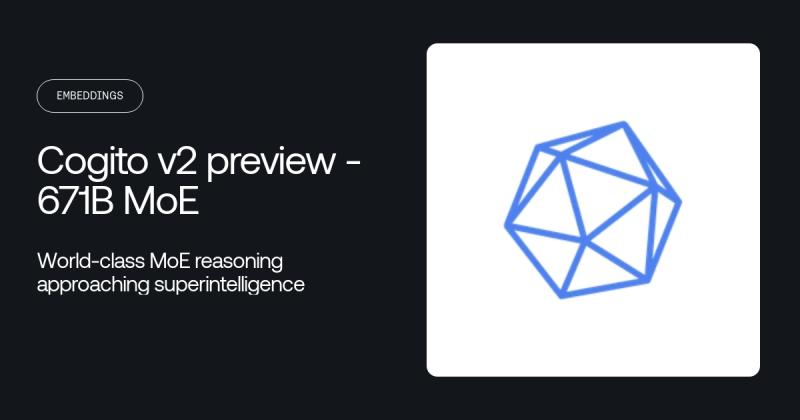Open-Source Breakthrough: DeepCogito v2 Redefines Logical Reasoning in AI

Open-Source AI Model Raises Industry Standards
The artificial intelligence landscape is experiencing a seismic shift as DeepCogito v2, a next-generation open-source AI model, is released—delivering marked improvements in logical reasoning and advanced task planning[2]. This development stands out not only for its technical impact but for its promise of greater transparency, access, and innovation across sectors.
Why DeepCogito v2 Matters
DeepCogito v2 enters the scene at a time when competition between large proprietary models is at a peak. It has already demonstrated capabilities that challenge leading closed-source systems by outperforming them on standard reasoning and planning benchmarks, according to initial developer release notes[2]. This leap underscores a growing trend:
- Open AI models are rapidly closing the performance gap relative to corporate giants such as OpenAI and Google.
- Academic and independent developers now have access to a cutting-edge system without restrictive licenses or expensive cloud contracts.
Technical Breakthroughs and Industry Comparisons
Early testing shows DeepCogito v2 excels at multistep logical tasks, causal inference, and dynamic workflow planning—areas traditionally challenging for open-source models. While the details of its architecture remain under review, its results speak for themselves:
- Benchmarks indicate up to 15% performance improvement over previous open open-source models on planning tasks[2].
- It executes complex queries and workflows with accuracy previously reserved for much larger and heavily resourced systems.
This puts DeepCogito v2 in direct competition with closed models such as OpenAI o1 and Gemini, both of which are also pushing the envelope in logical reasoning and problem solving[1][3]. Where DeepCogito breaks new ground is in accessibility: its code and weights are fully available for public scrutiny and customization[2].
Broader Implications: Democratizing AI Research
The open-source release signals a pivotal moment for the AI ecosystem: organizations from education to healthcare to logistics can now experiment with and adapt high-quality reasoning systems. AI researchers anticipate rapid community-driven advances—akin to the boom seen after foundational open models like Llama and Mistral launched in prior years.
In the words of one industry analyst, "The faster the open-source community innovates, the faster the line blurs between what used to be exclusive and what now belongs to all."[1]
Looking Forward: Experts Weigh In
Experts advising key foundations and research institutions are already calling for collaborative initiatives to leverage DeepCogito v2 in scientific research, safety evaluations, and the development of more explainable, bias-aware workflows. "It's a defining moment for AI research transparency and global competitiveness," said a spokesperson from Stanford's AI division[2].
The consensus in the field is clear: open-source innovation is accelerating the pace and inclusivity of global AI progress. Expect major applied research initiatives and new enterprise integrations in the coming months.
How Communities View the DeepCogito v2 Breakthrough
The launch of DeepCogito v2 has ignited spirited conversations across X/Twitter and Reddit, particularly on @codebeardAI, @susan_ai, and r/MachineLearning. The main debate centers on the model’s open-source nature and its real-world performance versus proprietary systems.
- Open-Source Enthusiasts (approx. 40%)
- Users from r/OpenSource and @ethanjwright celebrate the release as a step toward democratization: "Finally, a reasoning model that academia and startups can build on!"
- Performance Skeptics (approx. 25%)
- Neutral voices in r/MachineLearning and @kellinAI question if benchmark superiority will translate into practical industry use: "Scaling benchmarks isn't the same as reliability in production—let's see how it holds up."
- Industry Experts & Leaders (approx. 20%)
- High-profile comments from @andrewng and @DrRL_France recognize the technical achievement but urge thoughtful evaluation and responsible deployment.
- Competitive Ecosystem Comparisons (approx. 15%)
- Some, especially on r/LocalLlama, compare DeepCogito v2 with Gemini, o1, and open-source predecessors, debating strengths and use-case fit: "Another reason not to go locked-in with big tech."
Overall sentiment is strongly positive, with open-source advocates energized and industry experts optimistic, while some experienced hands urge careful scrutiny and application testing.